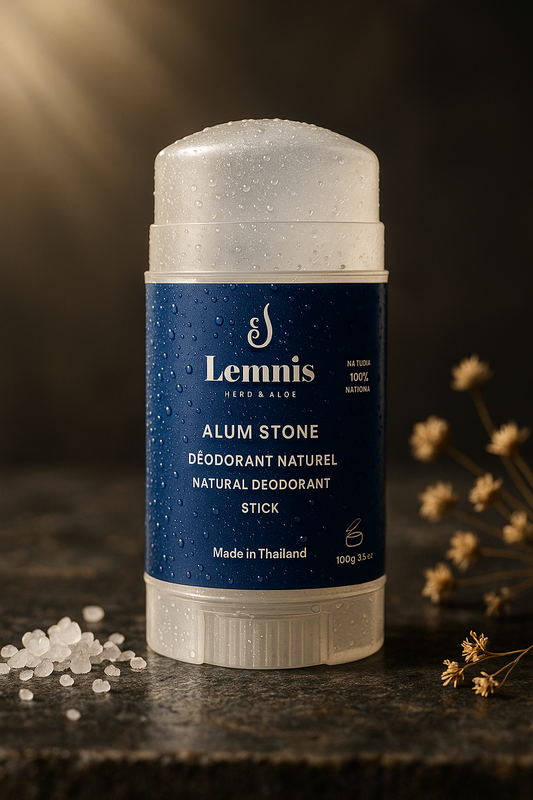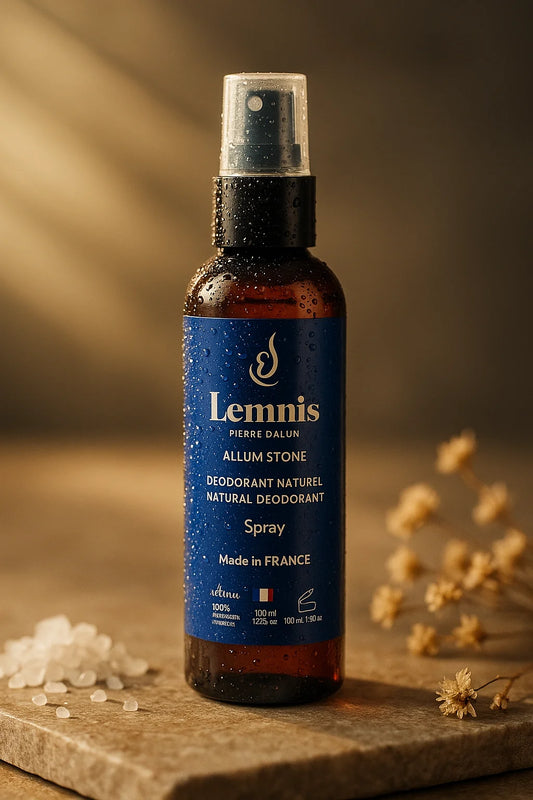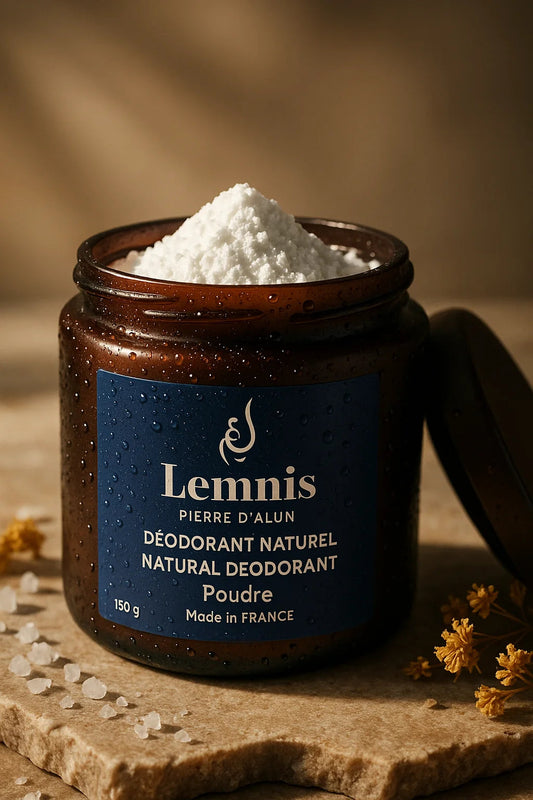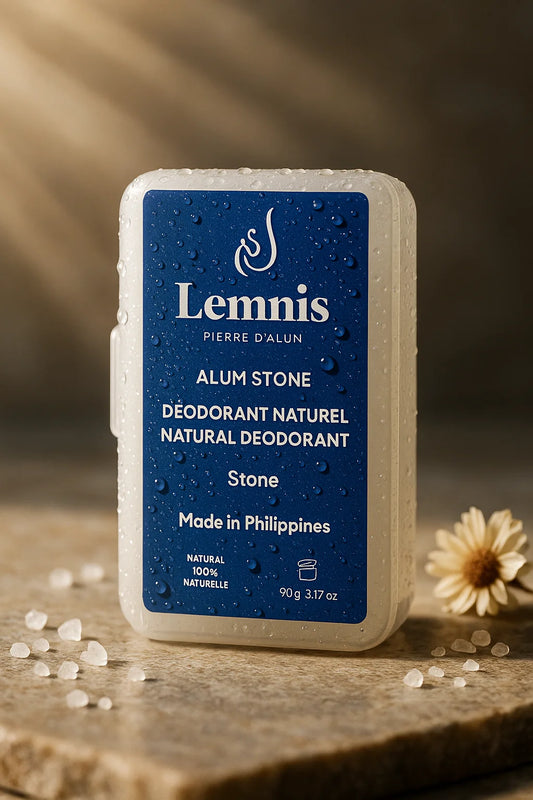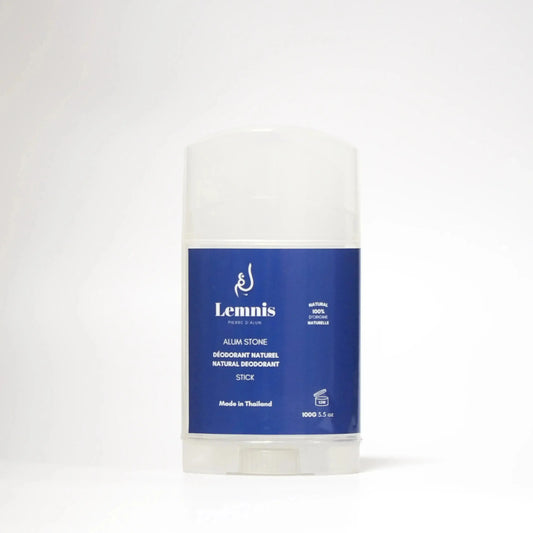
Alum Stone Cancer
Share
Points covered in this article
- Introduction
- What is alum stone?
- Alum Stone and Cancer: Where Does the Controversy Come From?
- Conclusion: Alum stone, danger or simple misunderstanding?
Introduction
Alum stone is often touted as a natural alternative to traditional deodorants. Yet one question regularly arises: is there a link between alum stone and cancer ? This mineral, rich in aluminum salts, has sparked debate for several years, fueled by fears surrounding aluminum and its effects on health.
But then, should we really be worried? Some studies point to a possible association between alum stone and cancer , while others believe that its use remains risk-free. Between precautions, preconceived ideas, and alternatives, it's time to sort out the facts from the lies.
In this article, we'll explore the origins of this stone, understand why it's controversial, and answer the question many people ask: is alum stone for cancer a myth or a reality? Finally, if you have any doubts, we'll give you some alternatives to stay cool and worry-free.
What is alum stone?
Alum stone is a natural mineral that has been used for centuries for its astringent and antibacterial properties. Known primarily as an alternative to conventional deodorants, it's often touted for its natural appearance and effectiveness against perspiration. But with current concerns about aluminum salts, some are wondering: is there a link between alum stone and cancer ? Before addressing this question, let's first look at where this stone comes from and how it's used.
Origin and composition of alum stone
Alum stone is extracted from natural deposits or manufactured synthetically. There are generally two types:
- Natural alum stone , composed of potassium alum, extracted from rocks rich in alunite.
- Synthetic alum stone , made from ammonium aluminum salts.
Although it is often seen as a healthier alternative to traditional deodorants, the question of alum stone cancer remains at the heart of debates, particularly due to the presence of aluminum in its composition.
Common uses: deodorant, shaving and more!
Alum stone is primarily used as a natural deodorant due to its antibacterial properties, thus reducing unpleasant odors. But it doesn't stop there:
- It soothes irritation after shaving and hair removal.
- It helps stop small bleeding thanks to its coagulating effect.
- It is sometimes used to purify water in some parts of the world.
However, despite its many benefits, the use of alum stone raises questions. Some consumers wonder if it is truly harmless or if it could be linked to a risk of alum stone cancer .
Why is it causing concern?
While alum stone has long been praised for its natural properties, it's not immune to controversy. The presence of aluminum in its composition is at the heart of the debate, with some fearing an effect similar to that of the aluminum salts found in conventional deodorants.
The link between alum stone and cancer is often discussed, particularly in research on the health effects of aluminum. Some studies suggest a potential link with breast cancer, while others believe there is no proven risk.
So, should we continue to use alum stone without fear or should we opt for other solutions? We will examine this question in the next section, by analyzing what the scientific studies say.
Alum Stone and Cancer: Where Does the Controversy Come From?
For several years now, alum stone has been at the center of a heated debate. Considered a natural alternative to traditional deodorants, it nevertheless contains aluminum salts, raising concerns. Some consumers and experts are wondering: Is there a real danger? Should we fear a link between alum stone and cancer ? To answer these questions, let's explore the available facts and studies.
Aluminum and health: a raging debate
The concern surrounding alum stone stems primarily from the presence of aluminum. Indeed, several studies have pointed to aluminum salts present in some conventional deodorants, suspected of being absorbed through the skin and having an impact on breast cells. This hypothesis has naturally led to questions about a possible link between alum stone and cancer .
However, not all types of aluminum are the same. Alum stone contains aluminum in a stable form (potassium aluminum sulfate), which would make it less likely to be absorbed through the skin. But is this enough to rule out any risk?
Scientific studies talk about it: what should we remember?
So far, studies on aluminum and breast cancer have not reached definitive conclusions. Some researchers believe that repeated exposure to aluminum may have an effect on breast cells, while others believe there is insufficient evidence to establish a direct link between alum stone and breast cancer .
The WHO and several health authorities consider that the aluminum contained in cosmetics is poorly absorbed by the skin and therefore poses no significant risk. However, in the absence of absolute scientific consensus, some prefer to adopt a precautionary principle and avoid any product containing aluminum salts, including alum stone.
Should we really be worried? We sort out the facts from the lies!
So, should you ban alum stone from your routine? Not necessarily. Current studies don't allow us to definitively state that alum stone and cancer are a proven solution. However, if you're concerned about the potential effects of aluminum on your health, it may be worth exploring more natural alternatives.
In summary, everyone is free to make their choice based on the information available and their level of risk tolerance.
Conclusion: Alum stone, danger or simple misunderstanding?
After exploring the origins of alum stone, its uses, and the controversies surrounding it, it's time to take stock. The idea of a link between alum stone and cancer continues to fuel debate, but what's the reality?
What we know today
Available scientific studies do not allow us to definitively state whether alum stone poses a health risk. Some experts believe that it contains a less absorbable form of aluminum, while others recommend applying a precautionary principle due to the lack of conclusive data on alum stone cancer .
Ultimately, there is no definitive proof of risk, but there is also no absolute guarantee of safety. Everyone must therefore weigh the pros and cons according to their own beliefs.
Listen to your body and make your choices
If you've been using alum stone without experiencing any adverse effects and are comfortable using it, there's no need to panic. However, if you're unsure or want to avoid exposure to aluminum salts, there are now many natural alternatives that are just as effective.
While it's legitimate to wonder about the link between alum stone and cancer , it's important not to give in to excessive fear. Staying informed and making informed choices is the best approach to maintaining your health and well-being.
The key: get informed without giving in to panic
The debate surrounding alum stone for cancer shows no signs of abating, and new studies may shed light on the situation in the coming years. In the meantime, the most important thing is to make a choice that's right for you, based on the available information and your own feelings.
Whether you decide to continue using it or turn to other options, the key is to take a reasoned approach and avoid giving in to fear. After all, the best solution is the one that suits you and respects your health and peace of mind.

